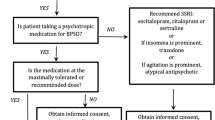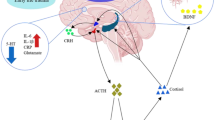Abstract
Background
Although neuropsychiatric symptoms are reported in stroke survivors, details of its prevalence and patterns among young stroke subjects are sparse.
Methods
In a hospital-based cross-sectional study in India, we recruited 150 young stroke subjects (aged < 45 years) and their caregivers > 3 months from ictus. Neuropsychiatric symptoms were evaluated using the Neuropsychiatric Inventory-12 (NPI-12) and self-reported depression with the Centre for Epidemiological Studies - Depression (CES-D) scale. Descriptive statistics were used. Multivariate analysis was performed to identify associated factors. All statistical analyses were carried out using STATA ver. 14.2, StataCorp, TX, USA.
Results
Eighty-four (56%; 95% CI: 47.7–64.1%) had ≥ 1 symptoms on the NPI-12 over median time from stroke of 2 years (IQR 2). Self-reported depression was seen in 71 (47.3%). Post-stroke epilepsy was associated with presence of at least one neuropsychiatric symptom. Dementia was associated with increased odds; and having spouse as principal caregiver with reduced odds, of self-reported depression. Multiple infarcts on imaging were associated with self-reported depression (OR: 3.29; 95%CI: 1.31–8.27) and presence of any neuropsychiatric symptom (OR: 3.55; 95% CI: 1.42–8.88).
Conclusion
Young stroke survivors frequently have neuropsychiatric symptoms with depression being most common. Presence of multiple infarcts on imaging was associated with self-reported depression and presence of any neuropsychiatric symptom.


Similar content being viewed by others
Data availability
Will be made available on request.
References
Chen T, Zhang B, Deng Y, Fan JC, Zhang L, Song F (2019) Long-term unmet needs after stroke: systematic review of evidence from survey studies. BMJ Open 9:e028137
Hackett ML, Köhler S, O’Brien JT, Mead GE (2014) Neuropsychiatric outcomes of stroke. Lancet Neurol 13:525–534
Kim JS, Choi-Kwon S, Kwon SU, Lee H, Park KA, Seo YS (2005) Factors affecting the quality of life after ischemic stroke: young versus old patients. J Clin Neurol Seoul Korea 1:59–68
Singhal AB, Biller J, Elkind MS, Fullerton HJ, Jauch EC, Kittner SJ, Levine DA, Levine SR (2013) Recognition and management of stroke in young adults and adolescents. Neurology 81:1089–1097
Razdan S, Koul RL, Motta A, Kaul S (1989) Cerebrovascular disease in rural Kashmir, India. Stroke 20:1691–1693
Naess H, Waje-Andreassen U, Thomassen L, Nyland H, Myhr KM (2006) Health-related quality of life among young adults with ischemic stroke on long-term follow-up. Stroke 37:1232–1236
Muli G, Rhoda A (2013) Quality of life amongst young adults with stroke living in Kenya. Afr Health Sci 13:632–638
Waje-Andreassen U, Thomassen L, Jusufovic M, Power KN, Eide GE, Vedeler CB, Naess H (2013) Ischaemic stroke at a young age is a serious event--final results of a population-based long-term follow-up in Western Norway. Eur J Neurol 20:818–823
Dar SK, Venigalla H, Khan AM, Ahmed R, Mekala HM, Zain H, Shagufta S (2017) Post stroke depression frequently overlooked, undiagnosed, untreated. Neuropsychiatry 7:906–919
Hachinski V, Iadecola C, Petersen RC, Breteler MM, NYenhuis DL, Black SE, Powers WJ et al (2006) National Institute of Neurological Disorders and Stroke-Canadian Stroke Network vascular cognitive impairment harmonization standards. Stroke 37:2220–2241
Wong A, Cheng ST, Lo ES, Kwan PW, Law LS, Chan AY, Wong LK, Mok V (2014) Validity and reliability of the neuropsychiatric inventory questionnaire version in patients with stroke or transient ischemic attack having cognitive impairment. J Geriatr Psychiatry Neurol 27(4):247–252
Greenop KR, Almeida OP, Hankey GJ, van Bockxmeer F, Lautenschlager NT (2009) Premorbid personality traits are associated with post-stroke behavioral and psychological symptoms: a three-month follow-up study in Perth, Western Australia. Int Psychogeriatr 21(6):1063–1071
Rush BK, McNeil RB, Gamble DM, Luke SH, Richie AN, Albers CS, Brown RD, Brott TG, Meschia JF (2010) Behavioral symptoms in long term survivors of ischemic stroke. J Stroke Cerebrovasc Dis 19(4):326–332
Castellanos-Pinedo F, Hernández-Pérez JM, Zurdo M, Rodríguez-Fúnez B, Hernández-Bayo JM, García-Fernández C, Cueli-Rincón B, Castro-Posada JA (2011) Influence of premorbid psychopathology and lesion location on affective and behavioral disorders after ischemic stroke. J Neuropsychiatr Clin Neurosci 23(3):340–347
Angelelli P, Paolucci S, Bivona U, Piccardi L, Ciruli P, Cantagallo A et al (2004) Development of neuropsychiatric symptoms in poststroke patients: a cross-sectional study. Acta Psychiatr Scand 110(1):55–63
Gupta M, Dasgupta A, Khwaja GA, Chowdhury D, Patidar Y, Batra A (2014) Behavioural and psychological symptoms in poststroke vascular cognitive impairment. Behav Neurol 430128
Gupta M, Dasgupta A, Khwaja GA, Chowdhury D, Patidar Y, Batra A (2013) The profile of behavioral and psychological symptoms in vascular cognitive impairment with and without dementia. Ann Indian Acad Neurol 16(4):599–602
Bandyopadhyay TK, Biswas A, Roy A, Guin DS, Gangopadhyay G, Sarkhel S, Ghoshal MK, Senapati AK (2014) Neuropsychiatric profiles in patients with Alzheimer’s disease and vascular dementia. Ann Indian Acad Neurol 17:325–330
Wang X, Shang S, Yang H, Ai H, Wang Y, Chang S, Sha X, Wang L, Jiang X (2019) Associations of psychological distress with positive psychological variables and activities of daily living among stroke patients: a cross-sectional study. BMC Psychiatry 19:381
Kapoor A, Lanctot KL, Bayley M, Herrmann N, Murray BJ, Swartz RH (2019) Screening for post-stroke depression and cognitive impairment at baseline predicts long-term patient-centered outcomes after stroke. J Geriatr Psychiatry Neurol 32(1):40–48
Sarfo FS, Jenkins C, Singh A, Owolabi M, Ojagbemi A, Adusei N, Saulson R, Ovbiagele B (2017) Post-stroke depression in Ghana: characteristics and correlates. J Neurol Sci 379:261–265
Fishman KN, Ashbaugh AR, Lanctot KL, Cayley ML, Herrmann N, Murray BJ, Sicard M, Lien K, Sahlas DJ, Swartz RH (2019) The role of apathy and depression on verbal learning and memory performance after stroke. Arch Clin Neuropsychol 34(3):327–336
Cheng S-T, Kwok T, Lam LCW (2012) Neuropsychiatric symptom clusters of Alzheimer’s disease in Hong Kong Chinese: prevalence and confirmatory factor analysis of the Neuropsychiatric Inventory. IntPsychogeriatr 24:1465–1473
Gorelick PB, Scuteri A, Black SE et al (2011) Vascular contributions to cognitive impairment and dementia: a statement for healthcare professionals from the American Heart Association/American Stroke Association. Stroke. 42:2672–2713
Hackett ML, Yapa C, Parag V, Anderson CS (2005) Frequency of depression after stroke: a systematic review of observational studies. Stroke 36(6):1330–1340
Shi Y, Yang D, Zeng Y, Wu W (2017) Risk factors for post stroke depression a meta-analysis. Front Aging Neurosci 9:218–232
Paolucci S (2008) Epidemiology and treatment of post-stroke depression. Neuropsychiatr Dis Treat 4(1):145–154
Wu S, Ma L, Sun Z, Wang A (2017) Analysis of depression and anxiety in patients with post-stroke epilepsy. Int J Clin Exp Med 10:6994–6999
Robinson RG, Jorge RE (2016) Post stroke depression: a review. Am J Psychiatry 173(3):221–231
Wong A, Lau AY, Yang J, Wang Z, Liu W, Lam BYK et al (2016) Neuropsychiatric symptom clusters in stroke and transient ischemic attack by cognitive status and stroke subtype: frequency and relationships with vascular lesions, brain atrophy and amyloid. PLoS One 11(9):e0162846
Lau CG, Tang WK, Liu XX, Liang HJ, Lian Y, Wong A et al (2017) Poststroke agitation and aggression and social quality of life: a case control study. Top Stroke Rehabil 24:126–133
Maaijwee NAMM, Rutten-Jacobs LCA, Schaapsmeerders P, van Djik EJ, de Leeuw FE (2014) Ischaemic stroke in young adults: risk factors and long-term consequences. Nat Rev Neurol 10:315–325
Camilo O, Goldstein LB (2004) Seizures and epilepsy after ischemic stroke. Stroke 35:1769–1775
Caeiro L, Ferro JM, Costa J (2013) Apathy secondary to stroke: a systematic review and meta-analysis. Cerebrovasc Dis 35:23–39
Cordonnier C, Henon H, Derambure P, Pasquier F, Leys D (2007) Early epileptic seizures after stroke are associated with increased risk of new-onset dementia. J Neurol Neurosurg Psychiatr 78(5):514–516
Leidy NK, Elixhauser A, Vickrey B, Means E, Willian MK (1999) Seizure frequency and the health-related quality of life of adults with epilepsy. Neurology 53:162–166
vanTuijl JH, van Raak EPM, van Oostenbrugge RJ, Aldenkamp AP, Rouhl RPW (2020) Cognition and quality of life in patients with poststroke epilepsy: a case-control study. Epilepsy Behav 104:106444
Tiel C, Sudo FK, Alves GS, Ericeira-Valente L, Moreira DM, Laks J, Engelhardt E (2015) Neuropsychiatric symptoms in vascular cognitive impairment: a systematic review. Dement Neuropsychol 9:230–236
Ferro JM, Caeiro L, Figueira ML (2016) Neuropsychiatric sequelae after stroke. Nat Rev Neurol 12(5):269–280
Sangam S (2018) Post-stroke depression: epidemiology, diagnosis, risk factors, and management. J Neurol Disord 6:394–400
McCarthy MJ, Sucharew HJ, Alwell K, Moomaw CJ, Woo D, Flaherty ML et al (2016) Age, subjective stress and depression after ischemic stroke. J Behav Med 39:55–64
Author information
Authors and Affiliations
Contributions
All authors contributed to the study conception and design. Material preparation and data collection were done by Done Indira Priya. Analysis was performed by Rajeswari Aghoram. The first draft of the manuscript was written by Done Indira Priya. All authors commented on previous versions of the manuscript. All authors read and approved the final manuscript.
Corresponding author
Ethics declarations
Ethics approval
Institute ethics committee approved (JIP/IEC/2017/0450).
Conflict of interest
The authors declare no competing interests.
Additional information
Publisher’s note
Springer Nature remains neutral with regard to jurisdictional claims in published maps and institutional affiliations.
Rights and permissions
About this article
Cite this article
Priya, D.I., Aghoram, R. & Narayan, S.K. Neuropsychiatric symptoms among young stroke survivors—frequency, patterns, and associated factors. Neurol Sci 42, 5021–5027 (2021). https://doi.org/10.1007/s10072-021-05178-2
Received:
Accepted:
Published:
Issue Date:
DOI: https://doi.org/10.1007/s10072-021-05178-2




